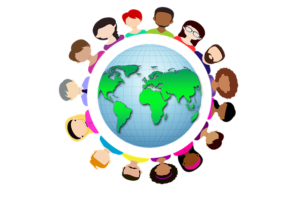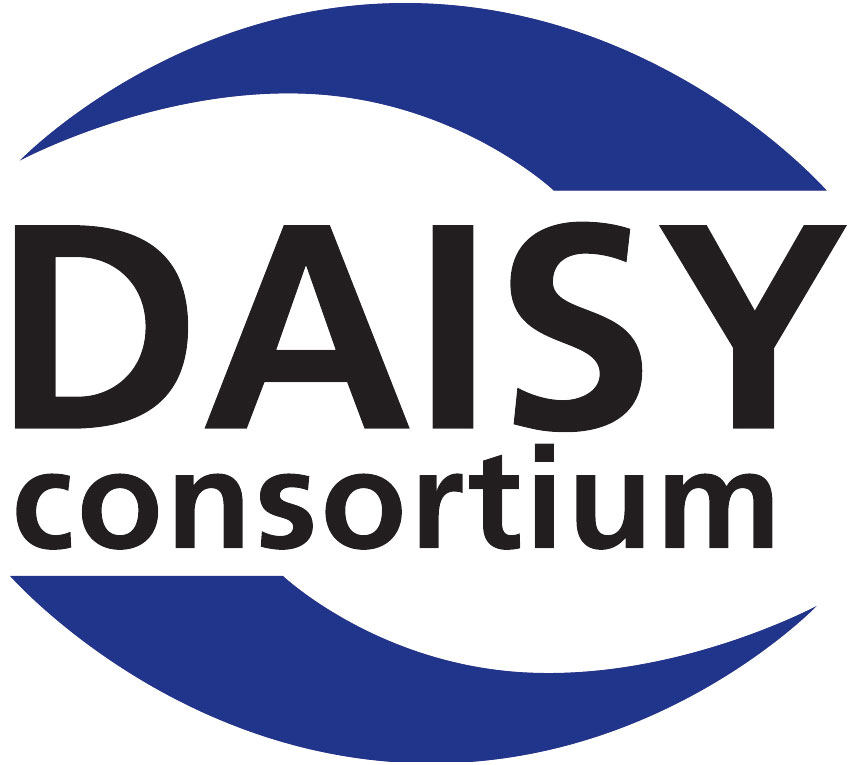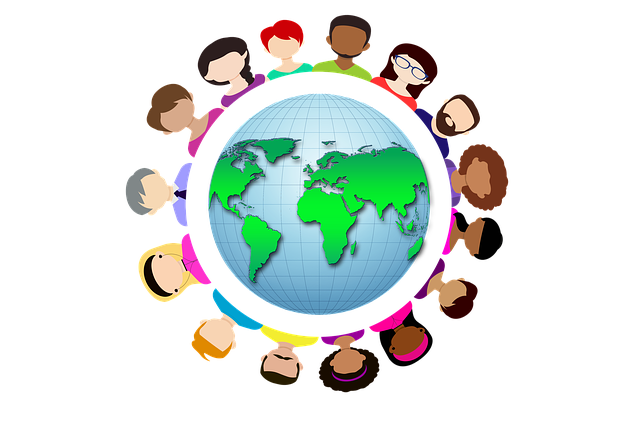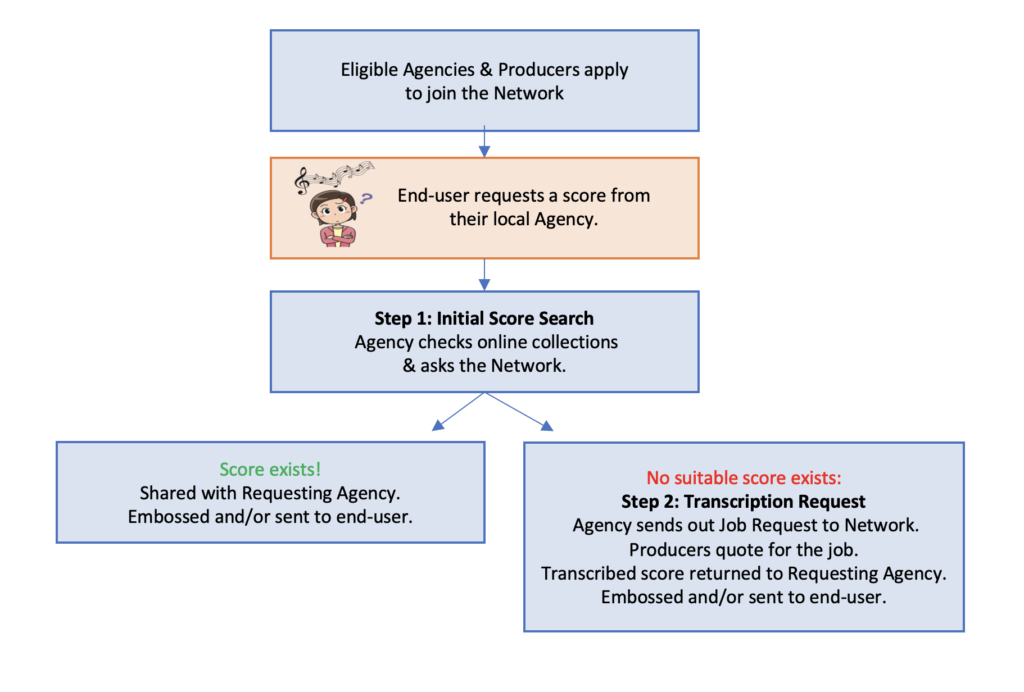Music Braille Production Network (MBPN)
This page is for:
Eligible members of the DAISY Music Braille Production Network, namely:
- All WIPO-registered Authorized Entities producing accessible (barrier-free) media under the terms of the Marrakesh Treaty.
- Any blindness agency or library for the blind which:
- needs to obtain music braille scores for blind musicians
- produces music braille scores
- Any professional transcription agency or independent professional transcriber which produces music braille scores for blindness agencies or for libraries for the blind.
What is the Music Braille Production Network (MBPN)?
The MBPN is an active group of experienced music braille producers, blindness agencies and braille libraries able to efficiently source existing files from each other, and to commission new productions between each other in an effective way. These scores may be for individual end-users and/or to be added to library collections.
The Network is a B2B process for music braille producers, blindness agencies and braille libraries who register to join. End-users cannot join the Network themselves.
The Network was developed and trialled from 2021 to 2023, creating a smooth and efficient way for agencies to share scores and commission productions between each other for the benefit of blind musicians around the world. You can read more about the history of the Network.
After refining the process and developing agreed production methods, the Network is now fully functioning and open to other agencies and Producers.
How the Network benefits the sector
1. Some agencies do not have music braille expertise themselves and rely on others for sourcing existing scores or for production. The Network gives these agencies an efficient way to request existing score or commission new productions to a pool of producers who do have expertise and capacity.
2. Agencies who do have music braille expertise wish to protect that expertise and ensure sufficient demand to keep skills alive. The Network generates demand for that expertise and permits skills development and knowledge transfer.
3. The demand for music braille can vary throughout the year in different countries. The Network enables agencies to share resources and capacity when and where it’s needed.
4. Music braille requests vary from simple to complex scores, vocal, choral, orchestral and instrumental, through to long music textbooks containing literary braille interspersed with music braille. Different producers have different specialisms. The Network makes it possible to locate suitable producers from anywhere in the world with one simple request.
5. Each country has their own way of formatting and producing music braille, depending on local standards and customs. The Network has agreed a common approach to the production of scores for international use, making them much easier to share and for end-users to read.
6. Countries who have implemented The Marrakesh Treaty into legislation make it possible for files to be more easily shared/converted into accessible formats, including music braille. The Network is one way in which agencies can maintain communication about production of new scores.
7. Music braille scores available through Authorized Entities (as defined by WIPO which oversees the implementation of the Marrakesh Treaty), are eligible to be added to the online ABC Global Books Collection. The Network facilitates greater numbers of scores being produced and shared in this online collection for wide international benefit.
Summary of the process
- Eligible Agencies and music braille Producers join the Network.
- End-user requests a score from their local Agency.
- If the Agency cannot fulfil the request themselves, the agency can contact the Network in two steps to Request the score:
-
- Initial Score Search:
The Requesting Agency checks to see if a suitable score already exists, in online collections and by asking the Network. Network members respond with details of what they have, and share suitable files with the Requesting Agency. The Requesting Agency embosses the score and/or sends it to the end-user. - Transcription Request (if no suitable score exists):
If no suitable score is available, the Requesting Agency completes and sends out a detailed Job Request form to the Network. Producers respond with a quote for doing the transcription. Work can be described as ‘Standard’ or ‘Advanced’ to indicate the level of complexity of the transcription. The Producer will charge their own transcription rate per print page for a ‘Standard’ or ‘Advanced’ job. The final score will be returned by the selected Producer to the Requesting Agency, who embosses the score and/or sends it to the end-user.
- Initial Score Search:
Information for current or prospective members
Apply to join the Network
Send an email to musicbraille [at] daisy [dot] org requesting to join, and include the following information:
-
- Organisation Name:
- Country:
- Registered as a WIPO Authorized Entity (Yes/No):
- Contact Name:
- Contact Email:
If your application is successful, you will be notified, signed up to the Network mailing list, and added to the list of participants on the webpage at daisy.org/mbpn
Download key documents
- The Network Handbook (13.06.2023): containing important information about being a member of the Music Braille Production Network, how the process works, how transcription costs are charged by producers, and standardized emails for information exchange.
- Guidance for producing scores for international use (04.07.2023): All Producers are encouraged to follow these agreed guidelines (unless otherwise specified in the Job Request). These guidelines, developed by producers in the trial, harmonize score production across different countries to make it easier to share files and read scores produced in other countries.
- Guidance for Engravers (using music notation tools to create accessible master scores. If scores need to be created in a music notation tool and exported as MusicXML before they can be translated into braille, our guidance for music engravers is proven to help them to create a ‘braille-friendly’ master file for us. The Network also has connections with ‘trusted engravers’ who are experienced at preparing scores for conversion into braille. You can ask the Network for their contact details.
- Metadata for Music Braille Files – Guidelines for Cataloguers.docx (19.02.2023): All cataloguers are encouraged to follow these agreed metadata guidelines. This will facilitate international sharing of digital braille music files and support effective search and retrieval from online collections of braille music so that users can find the materials they need and avoid duplicating transcription efforts.
Share your scores
Use the ABC Global Book Service to search for, and contribute, music braille scores. This on-line catalogue allows participating libraries for the blind and organizations serving people who are print disabled, known as Authorized Entities, to obtain easily the accessible content they need. The Service supports the goals of the Marrakesh VIP Treaty at a practical level. All producers are encouraged to add their scores to the ABC Global Book Service so that agencies have the widest access to available scores.
Network Members
- Ankara Music and Fine Arts University Barrier-Free Music Library Unit, Turkey
- Association of the Visually Impaired in Education Barrier-Free Music Note Library, Turkey
- Braille Orch, China
- BrailleScore, UK
- Dedicon, Netherlands
- dzb lesen, Germany
- Fundación Chile Música y Braille
- Helen Braille Music Group, Japan
- Italian Library for the Blind, Italy
- NLB, Norway
- NLS, USA
- ONCE, Spain
- RNIB, UK
- Sao Mai Centre for the Blind, Vietnam
- SBS, Switzerland
- Vision Australia, Australia
Find out more
For more information about the DAISY Music Braille Project, or the Music Braille Production Network please contact us at musicbraille [at] daisy [dot] org.
You can also sign up to one or more of the relevant mailing lists to get more involved, or simply to stay in touch with project activities.


